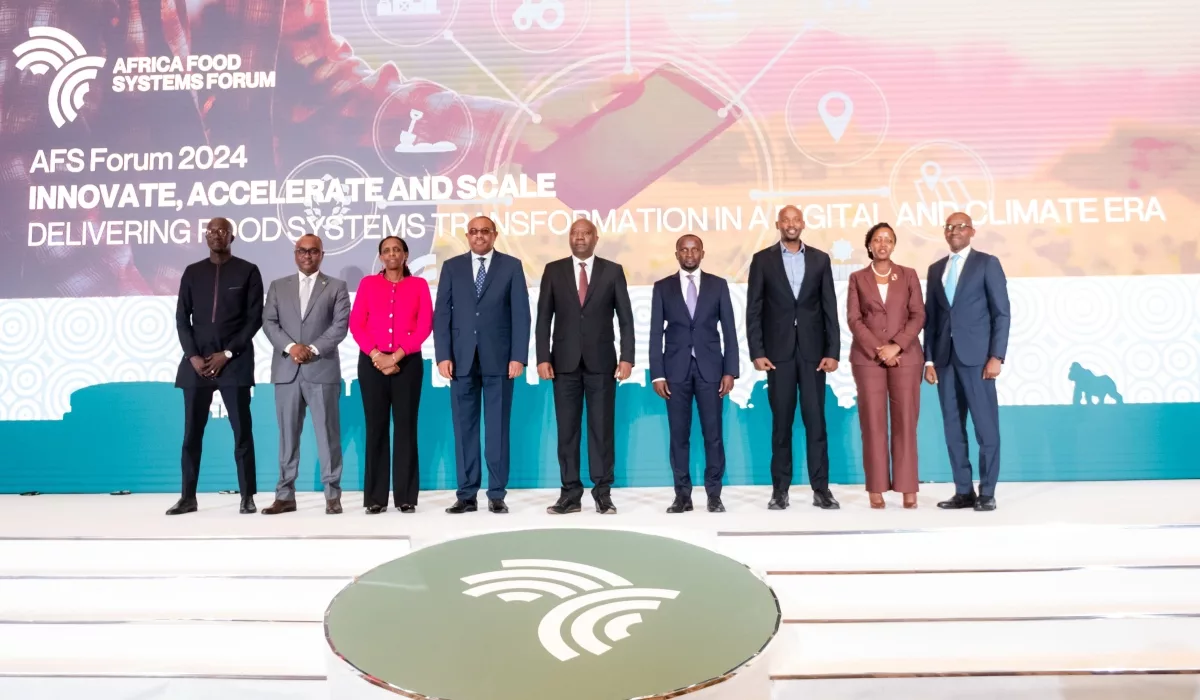|
Getting your Trinity Audio player ready...
|
Own Correspondent
Africa’s Food Systems Forum 2024 is set to convene over 5,000 stakeholders from across Africa and internationally.
The Annual summit to be hosted in Kigali, Rwanda aims to accelerate food systems transformation with youth and women at the helm a key focus.
World leaders, innovators, academia, development agencies, farmers’ organizations, and the private sector from across Africa and beyond will convene in Rwanda to participate in the annual Africa Food Systems Forum (AFSF) from September 2 to 6, 2024.
This year’s summit themed “Innovate, Accelerate, and Scale: Delivering Food Systems Transformation in a Digital and Climate Era,” will spotlight innovations and technologies, policies and delivery mechanisms, best practices, business models, and investments to accelerate food systems transformation in Africa with youth and women at the helm.
“Innovate” focuses on harnessing technologies, innovative policies, and business models to revolutionize agricultural practices and food production systems. “Accelerate” emphasizes the urgency of collective action to expedite sustainable food system transformations through technological advancements and innovative solutions. “Scale” highlights the need to expand proven models, initiatives, and investments to achieve widespread impact and ensure food security for millions.
These pillars together provide a comprehensive framework for driving meaningful change in Africa’s food systems.
Leaders at this year’s convening will also examine the urgent need to achieve the Sustainable Development Goals (SDGs) by 2030 and meet the Malabo Declaration’s commitments by 2025.
The event will be graced by H.E. President Paul Kagame, along with several current and former presidents, ministers, and key players from the government and the private sector. Their presence in the forum showcases a high-level commitment to addressing the critical issues facing Africa’s food systems.
Amath Pathé Sene, Managing Director of the AFS Forum, emphasized the importance of this year’s theme.
“Innovating, accelerating, and scaling are not just words, they are the pillars upon which the future of African food systems will be built. We are committed to leveraging the best of science, policy, and technology to drive this transformation. This year’s summit provides an unparalleled platform for stakeholders to come together, share insights, and forge partnerships that will lead to tangible actions. It is through such collective efforts that we can address the pressing challenges of climate change, food insecurity, and economic inclusivity.”
“Our goal is to create an environment where innovative ideas can flourish, leading to sustainable solutions that benefit all, especially our youth and women,” he added.
Rwanda Prime Minister, Edouard Ngirente, who officially launched the forum in March called for the transformation of agriculture and making it a powerful engine of the economy.
“To transform the agriculture sector into a powerful engine for economic development, our country is embracing innovation and making evidence-based-policy decisions. In this context, the Government has focused on de-risking the sector to ensure that it becomes more profitable and attractive for the youth and private sector actors,” said Dr Ngirente.
The summit will feature a rich program, including plenary sessions, thematic forums, side events, and leadership exchanges. It provides a unique, forward-looking platform for actionable dialogue and peer learning as stakeholders address the urgent need for innovative solutions to transform food systems in Africa.
In “Policy and Agenda Setting,” discussions will focus on highlighting progress toward transforming food systems while renewing political, policy, and investment commitments.
The “Investment Facilitation and Finance” sessions will promote innovative financing models designed to unlock investments from both the public and private sectors.
Knowledge-sharing sessions will be dedicated to disseminating the latest research, data, and technological advancements in the field, and “Technological Advancements” will showcase digital technologies and scalable solutions aimed at addressing both global and local food challenges.






